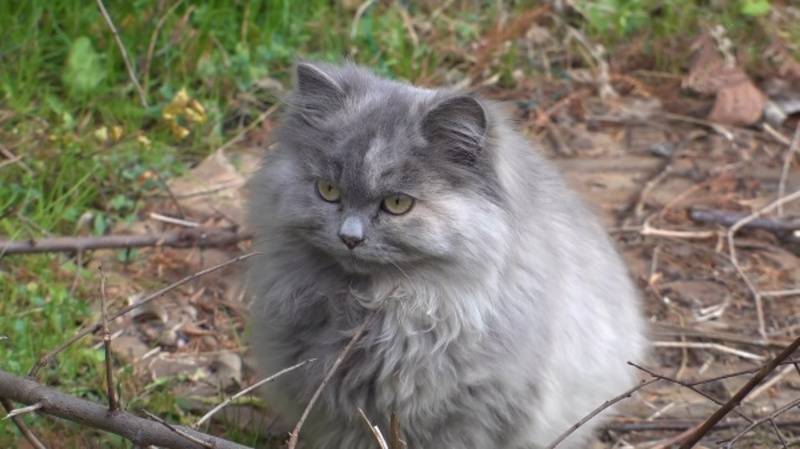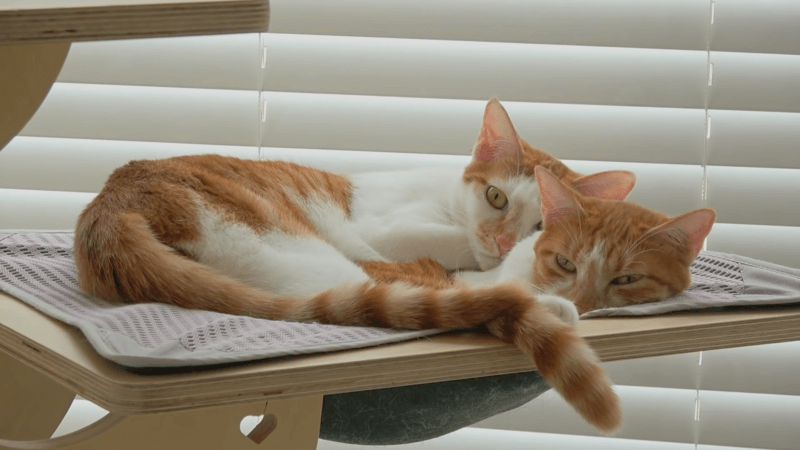No products in the cart.
Sleep is an essential aspect of a cat’s overall health and well-being, many cat owners wonder, Does CBD make cats sleepy? and if CBD can have a positive impact on their cat’s sleep patterns. In recent years, CBD has been explored as a natural option to promote relaxation and potentially improve sleep quality in cats. However, understanding the relationship between CBD and cat sleep requires careful consideration of various factors. In this blog, we will discover does CBD make cats sleepy, why won’t my cat sleep, and reasons why do cats get hyper at night.
Does CBD Make Cats Sleepy?
CBD has the potential to promote relaxation and reduce anxiety in cats, which may contribute to better sleep. While CBD can have a calming effect, its specific impact on sleep in cats can vary. It’s important to consider factors such as the individual cat’s response, dosage, and the specific CBD product used when assessing its effect on sleep. You can find out more about amazing CBD products for your cats at Pet CBD Club.
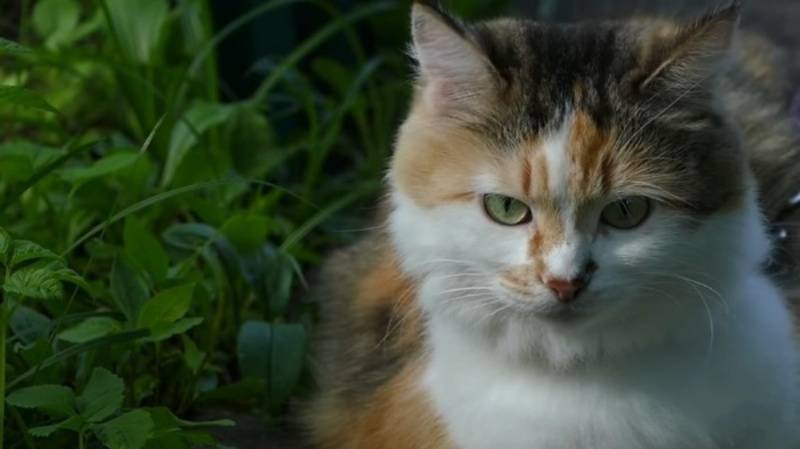
The Effects of CBD on Cats’ Sleep
Cats’ endocannabinoid system, which controls a number of physiological functions, including sleep, responds to CBD. By modulating the endocannabinoid system, CBD may help promote a state of relaxation and potentially improve sleep quality in cats. However, research on the direct effects of CBD on sleep in cats is still limited, and individual responses may vary.
Factors Should Be Considered When Using CBD for Sleep in Cats
When using a cat CBD oil to potentially enhance a cat’s sleep, several factors should be considered. These include the cat’s overall health, any underlying medical conditions, dosage, and the quality and source of the CBD product. It’s crucial to consult with a veterinarian experienced in CBD use for pets to determine the appropriate dosage and ensure the product’s safety and efficacy.
Advantages of CBD for Cat Sleep
CBD’s potential benefits for cats’ sleep include promoting relaxation, reducing anxiety or stress, and potentially improving sleep quality. Cats may experience better sleep patterns thanks to CBD’s potential relaxing effects on the endocannabinoid system. Individual responses might differ, therefore it’s crucial to keep in mind that further research is necessary to completely understand how CBD affects cats’ sleep.
Why Won’t My Cat Sleep?
Cats may have difficulty sleeping due to various factors, including:
- Environmental factors: Because cats are sensitive to their surroundings, modifications to their environment may cause sleep disturbances. Loud noises, bright lights, or sudden disturbances in the household can keep them awake or make it challenging for them to relax and fall asleep.
- Health issues: Underlying medical conditions can interfere with a cat’s sleep. Cats may have trouble finding a comfortable sleeping position or may wake up during the night due to pain or discomfort from ailments including arthritis, dental disorders, or digestive problems.
- Stress or anxiety: Cats are creatures of habit, and any changes or stressful events can affect their sleep. Stress and anxiety can keep cats up at night due to life changes like moving into a new house, getting a new pet or family member, or adjustments to their routine.
- Age-related changes: As cats age, their sleep patterns may change. Older cats may experience sleep disturbances due to age-related conditions, such as cognitive decline or medical issues. They may struggle to get to sleep or stay asleep all night.
- Lack of physical or mental stimulation: Cats require mental and physical exercise to tire them out and promote healthy sleep. If they don’t receive enough playtime or stimulation during the day, they may have excess energy that prevents them from settling down at night.
- Inconsistent sleep routine: Cats thrive on routine, and a lack of consistency in their sleep schedule can disrupt their natural sleep patterns. They may find it challenging to develop a regular sleep schedule due to inconsistent bedtimes or wakeup hours.
- External stimuli: Cats have keen senses, and external stimuli like noises, lights, or changes in temperature can affect their sleep. Noises from outside, bright lights, or uncomfortable room temperature can disturb their sleep and cause them to wake up or have fragmented sleep.
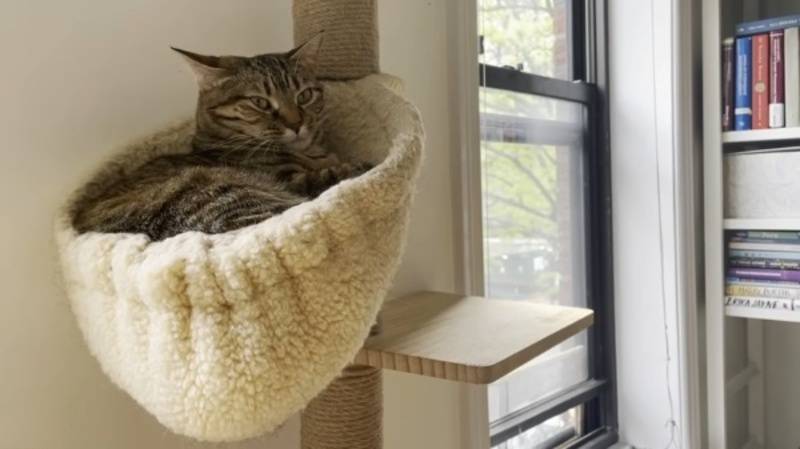
The Impact of Sleep Deprivation on Cat Health
The health of a cat can suffer from a lack of sleep. Cats who lack sleep may have compromised immune systems, which makes them more susceptible to diseases and infections. It also causes cognitive function to diminish, which might impair a cat’s capacity for learning and problem-solving. Cats deprived of sufficient sleep may exhibit behavioral issues, including increased irritability, aggression, or anxiety. Chronic sleep loss disrupts the hormone balance that regulates metabolism and hunger, which can result in weight gain or obesity.
Identifying the cause of a cat’s sleep issues is essential for addressing the problem effectively. There are some ways to identify the cause of cats sleeping problems:
- Observation: Carefully observe your cat’s behavior and sleep patterns. Take note of any specific triggers or patterns of sleep disruption.
- Environmental Assessment: Evaluate the cat’s sleeping environment for potential disturbances such as noise, light, temperature, or uncomfortable bedding. Make the necessary adjustments to create a peaceful and comfortable sleeping environment.
- Health Check: Schedule a veterinary examination to rule out any underlying medical conditions that may be causing discomfort or pain. Your veterinarian can provide guidance on potential health issues and appropriate treatment options.
- Stress and Anxiety Evaluation: Assess your cat’s overall stress levels and identify any potential sources of anxiety. Stressors like changes in routine, new additions to the household, or separation anxiety can disrupt sleep. Implement stress-reduction techniques and create a calm and secure environment.
- Mental and Physical Stimulation: Ensure your cat receives enough mental and physical stimulation during the day. Engage them in interactive play, provide scratching posts, and offer toys to help expend energy and promote more restful sleep.
The Importance of Sleep on Cats
Cats need to sleep enough to maintain their physical and mental health, thus they must get enough of it. During sleep, cats go through essential processes such as tissue repair, growth, and hormone regulation. It is during sleep that their bodies can restore and rejuvenate, supporting overall health and immune function. The cognitive functions of memory consolidation, learning, and problem-solving are all facilitated by sleep.
A cat’s emotional health is influenced by sleep, which helps to control mood and lessen stress. Good quality sleep ensures that cats wake up refreshed, energized, and ready to engage in their daily activities. Prioritizing healthy sleep habits for cats is essential for promoting their overall health, happiness, and longevity.
Why Do Cats Get Hyper at Night?
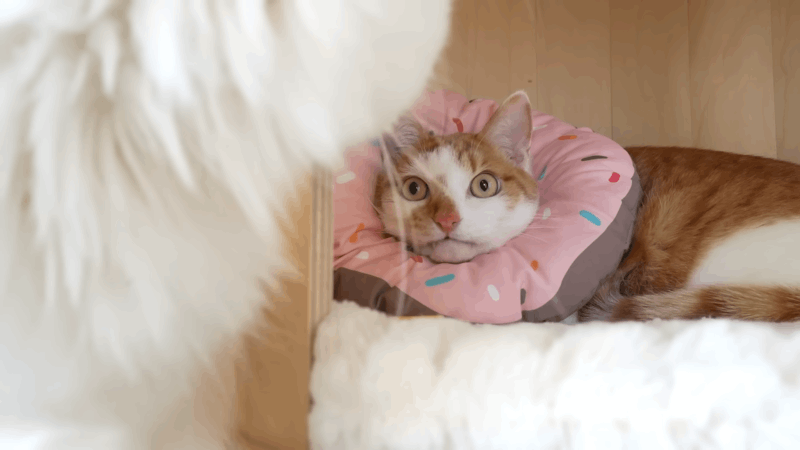
Cats are naturally crepuscular animals, which means they are more active during dawn and dusk. This is due to their hunting instincts and evolutionary adaptation to their prey’s behavior patterns. Cats may become hyper at night because it aligns with their innate hunting instincts and their heightened sensory awareness during low-light conditions.
What Causes Cats to Get Hyper at Night?
Several factors contribute to a cat’s hyperactivity at night. These include their natural circadian rhythm, lack of daytime stimulation or playtime, boredom, pent-up energy, an inconsistent routine, and environmental changes. Understanding these factors can help identify ways to manage a cat’s nighttime hyperactivity.
Strategies for Managing a Cat’s Nighttime Hyperactivity
To manage a cat’s nighttime hyperactivity, provide interactive play sessions during the day to tire them out. Engage them in mentally stimulating activities, such as puzzle toys or treat-dispensing toys. Establish a consistent play and feeding schedule, and create a calm environment in the evening by minimizing noise and offering cozy resting spots. Additionally, engaging in calming activities before bedtime, such as gentle play or interactive grooming, can help transition a cat into a more relaxed state for sleep.
Conclusion
Understanding and addressing a cat’s sleep issues is important for their overall well-being and quality of life. By observing their behavior, creating a comfortable sleep environment, addressing any medical concerns, managing stress levels, providing mental and physical stimulation, and establishing a consistent sleep routine, we can help improve their sleep quality. Prioritizing healthy sleep habits for cats promotes their physical, mental, and emotional health, leading to happier and healthier feline companions.
I am Nelson Cooper, I pursue my passion for writing and my belief is that cats love humans. I enjoy traveling and have a deep appreciation for the beauty of nature, as well as a soft spot for animals, particularly cats.

